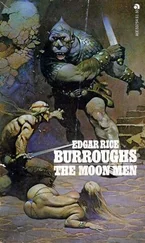Edgar Burroughs - The Moon Maid
Здесь есть возможность читать онлайн «Edgar Burroughs - The Moon Maid» весь текст электронной книги совершенно бесплатно (целиком полную версию без сокращений). В некоторых случаях можно слушать аудио, скачать через торрент в формате fb2 и присутствует краткое содержание. Жанр: Боевая фантастика, на английском языке. Описание произведения, (предисловие) а так же отзывы посетителей доступны на портале библиотеки ЛибКат.
- Название:The Moon Maid
- Автор:
- Жанр:
- Год:неизвестен
- ISBN:нет данных
- Рейтинг книги:3 / 5. Голосов: 1
-
Избранное:Добавить в избранное
- Отзывы:
-
Ваша оценка:
- 60
- 1
- 2
- 3
- 4
- 5
The Moon Maid: краткое содержание, описание и аннотация
Предлагаем к чтению аннотацию, описание, краткое содержание или предисловие (зависит от того, что написал сам автор книги «The Moon Maid»). Если вы не нашли необходимую информацию о книге — напишите в комментариях, мы постараемся отыскать её.
The Moon Maid — читать онлайн бесплатно полную книгу (весь текст) целиком
Ниже представлен текст книги, разбитый по страницам. Система сохранения места последней прочитанной страницы, позволяет с удобством читать онлайн бесплатно книгу «The Moon Maid», без необходимости каждый раз заново искать на чём Вы остановились. Поставьте закладку, и сможете в любой момент перейти на страницу, на которой закончили чтение.
Интервал:
Закладка:
I tell you that it was a very tense moment as the three men took their posts to await my word of command. If we had indeed discovered a true atmosphere beneath the surface of the Moon, what more might we not discover? If it were an atmosphere, we could propel the ship in it, and we could, if nothing more, go out on deck to breathe fresh air. It was arranged that at my word of command West was to shut off the generator, Jay to open the air cock, and Norton to start the pump. If fresh air failed to enter through the tube Jay was to give the signal whereupon Norton would reverse the pump, West start the generator, and immediately Jay would close the air cock again.
As Jay was the only man who was to take a greater chance than the others, I walked over and stood beside him, placing my nostrils as close to the air cock as his. Then I gave the word of command. Everything worked perfectly and an instant later a rush of fresh, cold air was pouring into the hull of The Barsoom, West and Norton had been watching the effects upon our faces closely, so that they knew almost as soon as we did that the result of our test had been satisfactory. We were all smiles, though just why we were so happy I am sure none of us could have told. Possibly it was just because we had found a condition that was identical with an earthly condition, and though we might never see our world again we could at least breathe air similar to hers.
I had them start the motors again then, and presently we were moving in a great spiral upward toward the interior of the Moon. Our progress was very slow, but as we rose the temperature rose slowly, too, while the barometer showed a very-slightly-decreasing atmospheric pressure. The luminosity, now above us, increased as we ascended, until finally the sides of the great well through which we were passing became slightly illuminated.
All this time Orthis had remained in irons in his state-room. I had given instructions that he was to be furnished food and water, but no one was to speak to him, I had taken Norton into my stateroom with me. Knowing Orthis to be a drunkard, a traitor and a potential murderer I had no sympathy whatsoever for him. I had determined to court-martial him and did not intend to spend the few remaining hours or years of my life cooped up in a small ship with him, and I knew that the verdict of any court, whether composed of the remaining crew of The Barsoom, or appointed by the Judge Advocate General of the Navy, could result in but one thing, and that was death for Orthis. I had left the matter, however, until we were not pressed with other matters of greater importance, and so he still lived, though he shared neither in our fears, our hopes, nor our joys.
About twenty-six hours after we entered the mouth of the crater at the surface of the Moon we suddenly emerged from its opposite end to look upon a scene that was as marvelous and weird, by comparison with the landscape upon the surface of the Moon, as the latter was in comparison with that of our own Earth. A soft, diffused light revealed to us in turn mountains, valleys and sea, the details of which were more slowly encompassed by our minds. The mountains were as rugged as those upon the surface of the satellite, and appeared equally as lofty. They were, however, clothed with verdure almost to their summits, at least a few that were within our range of vision. And there were forests, too—strange forests, of strange trees, so unearthly in appearance as to suggest the weird phantasmagoria of a dream.
We did not rise much above five hundred feet from the opening of the well through which we had come from outer space when I descried an excellent landing place and determined to descend. This was readily accomplished, and we made a safe landing close to a large forest and near the bank of a small stream. Then we opened the forward hatch and stepped out upon the deck of The Barsoom, the first Earth Men to breathe the air of Luna. It was, according to Earth time, eleven a m., January 8, 2026.
I think that the first thing which engaged our interest and attention was the strange, and then, to us, unaccountable luminosity which pervaded the interior of the Moon. Above us were banks of fleecy clouds, the under-surfaces of which appeared to be lighted from beneath, while, through breaks in the cloud banks we could discern a luminous firmament beyond, though nowhere was there any suggestion of a central incandescent orb radiating light and heat as does our sun. The clouds them-‘ selves cast no shadows upon the ground, nor, in fact, were there any well-defined shadows even directly beneath the hull of the ship or surrounding the forest trees which grew close at hand. The shadows were vague and nebulous, blending off into nothingnesses at their edges. We ourselves cast no more shadows upon the deck of The Barsoom than would have been true upon a cloudy day on Earth. Yet the general illumination surrounding us approximated that of a very slightly hazy Earth day. This peculiar lunar light interested us profoundly, but it was some time before we discovered the true explanation of its origin. It was of two kinds, emanating from widely different sources, the chief of which was due to the considerable radium content of the internal lunar soil, and principally of the rock forming the loftier mountain ranges, the radium being so combined as to diffuse a gentle perpetual light which pervaded the entire interior of the Moon. The secondary source was sunlight, which penetrated to the interior of the Moon through hundreds of thousands of huge craters penetrating the lunar crust. It was this sunlight which carried heat to the inner world, maintaining a constant temperature of about eighty degrees Fahrenheit.
Centrifugal force, in combination with the gravity of the Moon’s crust, confined the internal lunar atmosphere to a blanket which we estimated at about fifty miles in thickness over the inner surface of this buried world. This atmosphere rarefies rapidly as one ascends the higher peaks, with the result that these are constantly covered with perpetual snow and ice, sending great glaciers down mighty gorges toward the central seas. It is this condition which has probably prevented the atmosphere, confined as it is within an almost solid sphere, from becoming superheated, through the unthinkable ages that this condition must have existed. The Earth seasons are reflected but slightly in the Moon, there being but a few degrees difference between summer and winter. There are, however, periodic wind-storms, which recur with greater or less regularity once each sidereal month, due, I imagine, to the unequal distribution of crater openings through the crust of the Moon, a fact which must produce an unequal absorption of heat at various times and in certain localities. The natural circulation of the lunar atmosphere, affected as it is by the constantly-changing volume and direction of the sun’s rays, as well as the great range of temperature between the valleys and the ice-clad mountain peaks, produces frequent storms of greater or less violence. High winds are accompanied by violent rains upon the lower levels and blinding snowstorms among the barren heights above the vegetation line. Rains which fall from low-hanging clouds are warm and pleasant; those which come from high clouds are cold and disagreeable, yet however violent or protracted the storm, the illumination remains practically constant—there are never any dark, lowering days within the Moon, nor is there any night.
3
Animals or Men?
Of course we did not reach all these conclusions in few moments, but I have given them here merely as the outcome of our deductions following a considerable experience within the Moon. Several miles from the shin rose foothills which climbed picturesquely toward the cloudy heights of the loftier mountains behind them and as we looked in the direction of these latter, and then out across the forest, there was appreciable to us a strangeness that at first we could not explain, but which we later discovered was due to the fact that there was no horizon, the distance that one could see being dependent solely upon one’s power of vision. The general effect was of being in the bottom of a tremendous bowl, with sides so high that one might not see the top.
Читать дальшеИнтервал:
Закладка:
Похожие книги на «The Moon Maid»
Представляем Вашему вниманию похожие книги на «The Moon Maid» списком для выбора. Мы отобрали схожую по названию и смыслу литературу в надежде предоставить читателям больше вариантов отыскать новые, интересные, ещё непрочитанные произведения.
Обсуждение, отзывы о книге «The Moon Maid» и просто собственные мнения читателей. Оставьте ваши комментарии, напишите, что Вы думаете о произведении, его смысле или главных героях. Укажите что конкретно понравилось, а что нет, и почему Вы так считаете.








